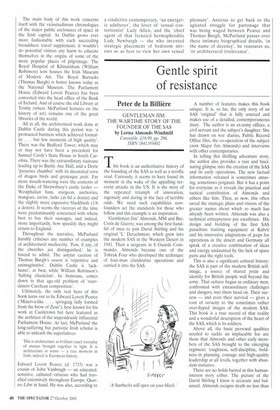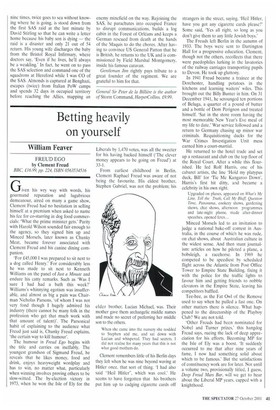Gentle spirit of resistance
Peter de la Billiere
GENTLEMAN JIM: THE WARTIME STORY OF THE FOUNDER OF THE SAS by Lorna Almonds Windmill Constable, .118.99, pp. 296, ISBN 1841193402 This book is an authoritative history of the founding of the SAS as well as a terrific read. Curiously, it seems to have found its moment in the wake of the appalling terrorist attacks in the US. It is the story of the repeated triumph of innovation, ingenuity and daring in the face of terrible odds. We need such capabilities now: founders set the standards for those who follow and this example is an inspiration.
'Gentleman Jim' Almonds, MM and Bar, Croix de Guerre, was among the first handful of men to join David Stirling and his original 'L' Detachment, which grew into the modern SAS in the Western Desert in 1941. Then a sergeant in 8 Guards Commando, Almonds became one of the Tobruk Four who developed the technique of four-man clandestine operations and carried it into the SAS.
A number of features makes this book unique. It is, so far, the only story of an SAS 'original' that is fully sourced and makes use of a detailed, contemporaneous diary. The author is an ex-army officer, a civil servant and the subject's daughter. She has drawn on war diaries, Public Record Office files, the co-operation of the subject (now Major Jim Almonds) and interviews with other contemporaries.
In telling this thrilling adventure story, the author also provides a rare and fascinating glimpse into the creation of the SAS and its early operations. The new factual information released is sometimes amusing, sometimes poignant. But it has a point for everyone as it reveals the practical and tactical contribution of Almonds and others like him. Then, as now, this often saved the strategic plans and visions of the greater names about which so much has already been written. Almonds was also a technical entrepreneur par excellence. His design and building of the first SAS parachute training equipment at Kabrit and his innovative adaptations of jeeps for operations in the desert and Germany all speak of a creative combination of ideas and energy undaunted by the lack of spare parts and the right tools.
This is also a significant cultural history: the SAS is part of the modern British selfimage, a source of shared pride and identity for British people well beyond the army. That culture began as ordinary men, confronted with extraordinary challenges and dangers, met them head on. Their success — and even their survival — gives a root of veracity to the sometimes rather over-hyped images of the modern SAS. This book is a true record of that reality and a wonderful description of the heart of the SAS, which is its soldiers.
Above all, the basic personal qualities needed to tackle an implacable foe are those that Almonds and other early members of the SAS brought to the emerging regiment: toughness, self-discipline, boldness in planning, courage and high-quality leadership at all levels, together with abundant initiative.
There are no holds barred in this humaninterest story either. The picture of the David Stirling I knew is accurate and balanced. Almonds escapes death no less than nine times, twice goes to sea without knowing where he is going, is stood down from the first SAS raid at the last minute by David Stirling so that he can write a letter home because his baby son is dying — the raid is a disaster and only 21 out of 54 return. His young wife discharges the baby from the Bristol Royal Infirmary, where doctors say. 'Even if he lives, he'll always be a weakling.' In fact, he went on to pass the SAS selection and command one of the squadrons at Hereford while I was CO of the SAS. Almonds is captured at Benghazi, escapes (twice) from Italian PoW camps and spends 32 days in occupied territory before reaching the Allies, mapping an enemy minefield on the way. Rejoining the SAS, he parachutes into occupied France to disrupt communications, builds a log cabin in the Forest of Orleans and keeps a German rescued from death at the hands of the Maquis to do the chores. After having to convince US General Patton that he is British, he returns to the UK and is commissioned by Field Marshal Montgomery, inside his famous caravan.
Gentleman Jim rightly pays tribute to a great founder of the regiment. We are grateful to him for that.
General Sir Peter de la Billiere is the author of Storm Command, HatperCollins, £9.99.
strangers in the street, saying, 'Heil Hitler, have you got any cigarette cards please?' Some said, 'Yes all right, so long as you don't give them to any little Jewish boys.'
The Freuds left Berlin in the autumn of 1933. The boys were sent to Dartington Hall for a progressive education. Clement, though not the others, recollects that there were paedophiles lurking in the lavatories of the railway carriages transporting pupils to Devon. He took up gluttony.
In 1941 Freud became a trainee at the Dorchester, handling potatoes in the kitchens and learning waiters' wiles. This brought out the Billy Bunter in him. On 31 December 1941, he scrounged ten portions of Beluga, a quarter of a pound of butter and a bottle of Dom Perignon and treated himself. 'Sat in the store room having the most memorable New Year's Eve meal of my life to date.' War service followed and a return to Germany chasing up minor war criminals. Requisitioning ducks for the War Crimes Investigation Unit mess earned him a court-martial.
He returned to the hotel trade and set up a restaurant and club on the top floor of the Royal Court. After a while this flourished. He fed Rolf Harris, one of his cabaret artists, the line 'Hold my platypus duck, Bill' for 'Tie Me Kangaroo Down', Harris's first hit ditty, and became a celebrity in his own right.
Upgraded on planes, appeared on What's My Line, Tell the Truth, Call My Bluff Question Time, Panorama, cookery shows, gardening shows, chat shows, afternoon programmes and late-night phone, made after-dinner speeches, opened fetes...
Minced Morsels led to an invitation to judge a national bake-off contest in Australia, in the course of which he was rude, on chat shows, about Australian culture in the widest sense. And then stunt journalism: articles on how he piloted a plane, a bobsleigh, a racehorse. In 1969 he competed to be speediest by scheduled flight across the Atlantic from Post Office Tower to Empire State Building, fixing it with the police for the traffic lights to favour him and getting friends to nobble elevators in the Empire State, leaving his competitors baffled.
Tee-hee, as the Fat Owl of the Remove used to say when he pulled a fast one. On other matters there is silence. What happened to the directorship of the Playboy Club? We are not told.
'Other Freuds had been nominated for Nobel and Turner prizes,' this hangdog Freud says, rueing the lack of deep appreciation for his efforts. Becoming MP for the Isle of Ely was a boost. 'It suddenly occurred to me that after nine years of fame, I now had something solid about which to be famous.' But the satisfactions of constituency work are for later. Not until a volume two, provisionally titled, I guess, Deep Freud Mars Bar, will we get to hear about the Liberal MP years, capped with a knighthood.











































































 Previous page
Previous page